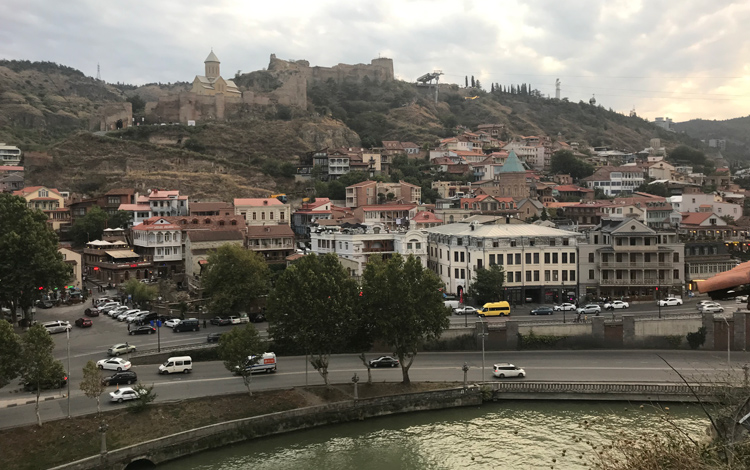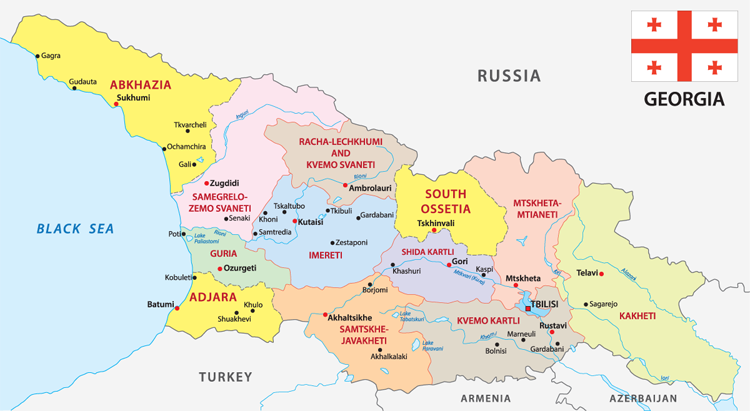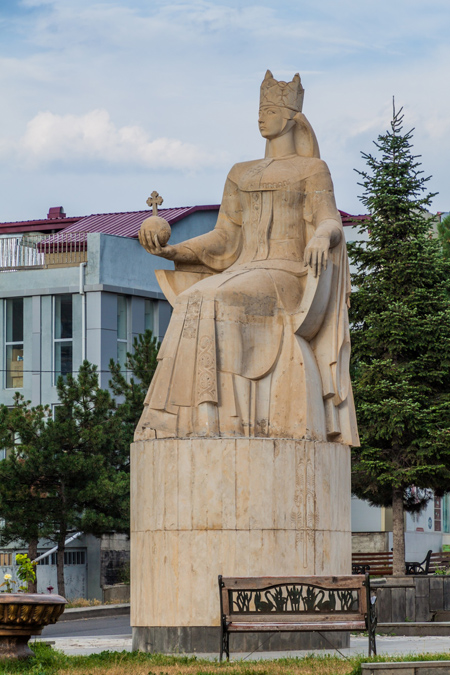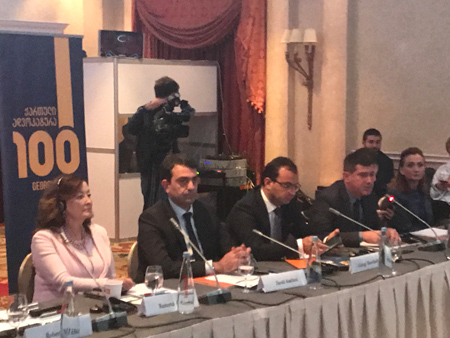An American judge gets a look at the rule of law in Georgia

Tbilisi is the capital city of Georgia. Photo provided by Judge Ramona G. See.
More than 7,100 miles away from the Torrance Courthouse in the Superior Court of California where I am the supervising judge, I found myself in a conference room in Tbilisi, Georgia, standing before judges, prosecutors and lawyers of the Georgian Bar, fielding judicial ethics questions that clearly had more local undertones than I could understand through the sporadic translations. Minutes before, I was surprised at the doorstep of the conference room by three different television station reporters to which I concluded that it must be a slow news day in Tbilisi to be interviewing me. Maybe they were looking for American-themed storylines given that the new Fast and Furious movie was being filmed on the city’s riverfront.
 Judge Ramona G. See (in pink) is interviewed by Georgian media. Photo provided by Judge See.
Judge Ramona G. See (in pink) is interviewed by Georgian media. Photo provided by Judge See.However, the Georgian legal community and the country are very interested in the evolving Georgian legal system and the spirited questions of the participants reflected this fact. In honor of the Georgian Bar Association’s 100th anniversary, judges of the Georgian judiciary, president and staff of the Georgian Bar Association, the chief prosecutor for Georgia as well as defense, prosecution and civil lawyers from Georgia attended the conference on Sept. 11 in Tbilisi, sponsored by the ABA’s Rule of Law Initiative (ROLI) to discuss and debate rule of law issues central to Georgian legal circles.
I had planned to be in Georgia to attend a wedding of a friend through a longtime international connection who was marrying a woman from Georgia. As a ROLI board member, I had volunteered to meet with a few local judges to talk about their legal system and issues. Through ROLI, to my surprise, the proposed casual meeting became a full-day conference. Because I was coming from Los Angeles, the media capital of the world, conference organizers thought the audience would be most interested in issues involving management of media in the courtroom in high-profile cases, as well as judicial ethics and bench-bar relations.
The president of the Georgian Bar Association, David Asatiani, welcomed the attendees and commented that the conference was a milestone for the Georgian bar as it assembled members of the bar, judges and lawyers who are not often brought together in a single forum. He expressed his sincere wish that there would be many future integrated engagements of the Georgian legal community. Only then did I realize the unique forum that I was addressing, and this explained the emotional question-and-answer periods that followed. ROLI has provided support for programs in Georgia in the past and Asatiani said he would welcome ROLI’s return to in-country support.
Georgia is a dramatically beautiful country resting between the massive Black and Caspian Seas with mountain ranges bordering Russia in the north that exceed 16,000 feet. Georgia is a former republic of the USSR and nestled between a geopolitical hotbed of Russia, Turkey, Azerbaijan and Armenia. Post-USSR Georgia struggled in civil conflicts and secessionist wars in Abkhazia and South Ossetia that border Russia. Although it was the birthplace of Joseph Stalin, Georgia has followed a pro-Western foreign policy and has sought NATO and European integration while embracing democratic, judicial and economic reforms.

Map of Georgia from Shutterstock.
The strong presence of female Georgian judges and lawyers in the audience was no surprise to me given the country’s history. On a trip outside of the capital to see the ruins of the ancient city-fortress of Uplistsikhe, I learned of the 29-year reign of Tamar, the first female ruler of Georgia, who often makes internet “most powerful women in history” lists.
 A monument to Tamar in Akhaltsikhe, Georgia. Photo by Matyas Rehak / Shutterstock.com.
A monument to Tamar in Akhaltsikhe, Georgia. Photo by Matyas Rehak / Shutterstock.com.Tamar, who ruled from from 1184 to 1213, is considered the most revered ruler in Georgian history. Even as a woman under the rigidity of Christianity at the time, Tamar was given the title, not of queen but “king of kings.” Tamar divorced her first husband and expelled him from the country following two coup attempts, running successful military campaigns throughout the region while introducing many social reforms to the country.
While I cannot imagine the challenges Tamar faced, as a female judge, I presented the logistical and legal challenges of high-profile cases in the United States. In the epicenter of celebrity and high media attention cases in the U.S., I have been personally involved in cases and a colleague of judges who have had to manage media-intensive cases involving well-known politicians, actors/actresses and music industry players. Georgian lawyers and judges have had to tackle their own recent challenges managing cases involving politicians, industry leaders and ethnic/regional diversity issues.
I stressed that in high-profile cases both judges and lawyers must have a plan before the trial starts, and not wait for the media to drive the process. I shared checklists with the attendees about everything from deciding whether the media in the courtroom should be allowed to use laptop computers, cell phones or other electronic devices for note taking to real-time transmission of trial testimony. Of course, cameras in the courtroom has been a challenge for courts throughout the U.S.
In dealing with the media, I advised the attendees to establish ground rules while being aware of media deadlines, as delays in the release or availability of case information will only hurt one’s credibility. I cautioned that the media is looking for soundbites—easily quotable statements. I advised the attendees to do their due diligence so they will be ready for questions the media will likely ask. Issues of courtroom and judicial security were of special interest to the attendees based on the questions asked in the open forum that followed my presentation. I also cautioned that sometimes the ‘court of public opinion’ has a powerful effect on the outcome and it may not be the effect you were hoping for.
In the afternoon session, I addressed ABA ethics code issues related to the relationships between judges and attorneys. The question-and-answer session following the ethics presentation was most revealing of the current concerns in Georgia. Georgian judges inquired about the treatment and remedies available to U.S. judges who are subject to public social media attacks. Georgian judges have apparently been the target of social media attacks based on current cases before them. In fact, some of the hypothetical questions posed to me involved questions about what could be done about photoshopping of a judge in a less than positive light.
 Judge Ramona G. See (in pink) was seated next to Georgian Bar Association President David Asatiani during the conference. Photo provided by Judge See.
Judge Ramona G. See (in pink) was seated next to Georgian Bar Association President David Asatiani during the conference. Photo provided by Judge See.I stressed that most US courts have a public information officer and the availability of county counsel. The Georgian judges in attendance expressed great satisfaction that the U.S. has some avenue of recourse in such circumstances. Generally, as individual judges, however, I stressed that U.S. judges are not allowed to comment on their pending cases. I cautioned that public officers, like public figures in general in the United States, are subjected to and often open to a higher level of public criticism under U.S. law.
The United States is not without the frailty of being constrained by public opinion, so I reviewed U.S. cases where judges, based on the law, had to take positions that were contrary to general public opinion, that, in some cases, resulted in judges losing their positions in states where judges are elected officials. Georgia attendees expressed concern for their own ability to express their interpretation of laws in the face of public and/or political opinion. Clearly, both the United States and Georgia continue to struggle on this front.

To conclude the conference, given that 80% of Georgia’s energy comes from hydroelectric power supplied by the rivers and dams of its high mountain ranges, Robert Miller, executive vice president and general counsel in the United States for the French-owned Electricite de France S.A., spoke to the attendees. He impressed upon them the need to diversify renewable energy resources given their concerns about dependence on Russian gas resources when the hydroelectric supply is impeded or in the event of cyberattacks to its hydro facilities by nation states. Georgia has begun to aggressively move forward on wind and solar projects in the country, visible just outside of the country’s capital of Tbilisi.
Miller also discussed the legal and public consultation issues surrounding relocation of indigenous peoples that occur with large dam projects. Georgian lawyers were intimately aware of the legal challenges of such projects and the impact on indigenous peoples.
President Asatiani was pleased by the multipractice attendance, interest and spirited question-and-answer periods during the conference. He was undoubtedly pleased with the commitment by Alberto Mora, director of ROLI and associate executive director for global programs, attending the Georgian Bar Association’s centennial celebration events in November.
Hon. Ramona G. See is a supervising judge in the Superior Court of Los Angeles County in Torrance, California.
• ABA Abroad is a column highlighting the work of the ABA’s Center for Global Programs, which comprises the Rule of Law Initiative, Center for Human Rights and the ABA’s presence at the United Nations.



